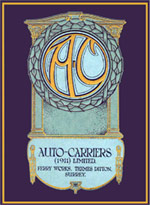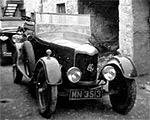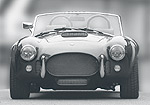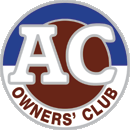| A BRIEF HISTORY OF
AC CARS
 In
1904 John Portwine, a wealthy butcher, and John Weller, a
gifted young engineer, formed Autocarriers Ltd in order to
produce the “Autocarrier” business tricar. This
vehicle was very successful and was used by many London stores
which was followed, in 1907, by the “Sociable”
passenger version. In
1904 John Portwine, a wealthy butcher, and John Weller, a
gifted young engineer, formed Autocarriers Ltd in order to
produce the “Autocarrier” business tricar. This
vehicle was very successful and was used by many London stores
which was followed, in 1907, by the “Sociable”
passenger version.
The factory moved to Thames Ditton in 1911 and by 1913 the
four wheel Fivet engined light car, known as the “Rolls
Royce of light cars”, was coming off the line.
 During
the twenties, under the control of S F Edge, AC cars were
powered by either the four-cylinder Anzani engine or the famous
Weller designed six-cylinder, alloy, OHC engine which, with
consistent development, enjoyed a record production run from
1919 to 1963. During
the twenties, under the control of S F Edge, AC cars were
powered by either the four-cylinder Anzani engine or the famous
Weller designed six-cylinder, alloy, OHC engine which, with
consistent development, enjoyed a record production run from
1919 to 1963.
1922 saw J A Joyce, driving an AC at Brooklands, being the
first light car to cover 100 miles in the hour and in 1926
the Monte Carlo Rally was won by the Hon Victor Bruce in a
six-cylinder car.
 The
thirties saw ACs, now owned by the Hurlock family, produce
a beautiful line of lean, low tourers, drophead coupés
and saloons, culminating with the competition two-seater just
prior to 1939 and the outbreak of hostilities. After the war
2 Litre saloons, dropheads and Buckland tourers were manufactured. The
thirties saw ACs, now owned by the Hurlock family, produce
a beautiful line of lean, low tourers, drophead coupés
and saloons, culminating with the competition two-seater just
prior to 1939 and the outbreak of hostilities. After the war
2 Litre saloons, dropheads and Buckland tourers were manufactured.
 In
1952 John Tojeiro's sports racing car formed the basis of
the alloy-bodied Ace which, with gently revised lines and
the Weller engine, was introduced in 1953. This was later
joined by the Aceca and Greyhound, with the options in 1956
and 1961 of Bristol and Ford engines respectively. The Ace
was particularly successful in competition and used by many
racing drivers at the outset of their careers. In
1952 John Tojeiro's sports racing car formed the basis of
the alloy-bodied Ace which, with gently revised lines and
the Weller engine, was introduced in 1953. This was later
joined by the Aceca and Greyhound, with the options in 1956
and 1961 of Bristol and Ford engines respectively. The Ace
was particularly successful in competition and used by many
racing drivers at the outset of their careers.
 1962
saw the introduction of the Cobra derivative of the Ace, which
in 4.7 and 7 litre forms, swept the board in International
competition, winning the World Sports Car Championship in
1965. The Cobra was discontinued in 1968, after which the
7 Litre, 140 mph, steel-bodied Frua 428 was offered. 1962
saw the introduction of the Cobra derivative of the Ace, which
in 4.7 and 7 litre forms, swept the board in International
competition, winning the World Sports Car Championship in
1965. The Cobra was discontinued in 1968, after which the
7 Litre, 140 mph, steel-bodied Frua 428 was offered.
The 1973 Earls Court Motor Show saw the appearance of the
prototype 3000ME which, with Ford V6 engine and grp bodywork
finally went into production in 1978 and continued until 1985.
During 1986, after 56 years of control, the Hurlock family
sold the company, ownership passing eventually to a partnership
of Autokraft Ltd and the Ford Motor Company. In 1988 AC Cars
moved to a new purpose built factory located within the historic
Brooklands race track and in 1992 Brian Angliss of Autokraft
acquired Ford's interest and assumed full control.
 From
1985 the revised Cobra in Mark IV form was the sole product,
but, in 1990, a new Ace was designed which in 1993, with North
American and EEC certification, entered production. From
1985 the revised Cobra in Mark IV form was the sole product,
but, in 1990, a new Ace was designed which in 1993, with North
American and EEC certification, entered production.
AC Cars was bought in 1997 by Alan Lubinsky and development
of the new AC Brooklands Ace, Aceca, Superblower and the Carbon
Road Series (CRS) Cobra and has continued under the AC Car
Group name, still at the Brooklands Factory in Weybridge,
Surrey.
This factory was sold and a slimmed down operation opened
up at a unit in Frimley in 2001. The activity at this latest
site concentrated on repairs, restorations and the production
of the MkII and MkIII 289 and 427 FIA Roadster.
 In October 2004 the Frimley factory closed down and moved to Guildford, and in 2005 to Hal Far in Malta. The Malta factory closed in 2008. In October 2004 the Frimley factory closed down and moved to Guildford, and in 2005 to Hal Far in Malta. The Malta factory closed in 2008.
|
